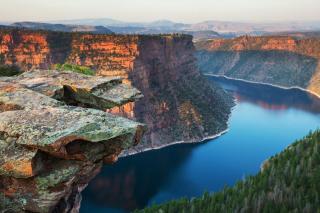10th Circuit backs Green River water exchange between federal government and Utah

(CN) — Utah may continue drawing water from the Flaming Gorge Reservoir as part of a Trump-era water deal with federal regulators, the 10th Circuit ruled Monday, affirming a 2021 decision from a federal court in Utah.
The U.S. Bureau of Reclamation, a branch of the Interior Department, "provided a reasoned explanation of its decision" to allow Utah to use the water, Circuit Judge Timothy Tymkovich wrote in a 38-page opinion published on Monday.
The agency not only showed the deal "would not significantly affect the water or fish resources in the Green River Basin" but also "adequately explained the methodology and scope of its decision," the George W. Bush appointee wrote.
The dispute — like many such water disputes currently playing out in the dry American Southwest — centers on dwindling supplies of Colorado River water. Forty million Americans, including members from 22 Native American tribes, depend on the Colorado River for water, as do 5.5 million acres of land and nearly two dozen national parks and preserves.
One of the Colorado River’s tributaries is the Green River, which winds through Utah and sustains ecosystems in the Browns Park National Wildlife Refuge, Dinosaur National Monument, Ouray National Wildlife Refuge and Canyonlands National Park. Several endangered fish species call the watershed home, including the Colorado pikeminnow, razorback sucker, bonytail and humpback chub.
In 1958, the U.S. Bureau of Reclamation appropriated 3.96 million acre-feet per year from the Green River to create the Flaming Gorge Reservoir in southwestern Wyoming and northeastern Utah. This current legal fight over that water dates back to 2016, when the Beehive State made the feds an offer.
If federal regulators allowed Utah to draw around 59,000 acre-feet of water from the reservoir every year for the next 50 years, it would agree to stop pulling an equivalent amount of water from the Green River. The U.S. Bureau of Reclamation approved the plan in 2019, relying on a localized analysis from 2012.
The Center for Biological Diversity and other environmental groups sued, arguing the new plan did not take into account how drastically drought and climate change are depleting the whole Colorado River system. The groups lost their initial case in 2021 but appealed that decision in February 2022.
Both Utah and the feds argue the "Green River Block Water Exchange," as the deal is known, will ultimately result in the same amount of water leaving Colorado River watersheds as before. Environmentalists contend the deal isn't that simple, as drought and climate change are reducing water across the Colorado River system. They argued a broader environmental impact assessment was needed.
In its opinion on Monday, the 10th Circuit disagreed — arguing environmental groups like the Center were "attempting to expand the scope" of the fed's environmental responsibilities in a way that was "not germane" to the specifics of this case.
Rather than studying the Colorado River or Green River systems overall, the U.S. Bureau of Reclamation was simply asked to analyze how moving Utah's "point of depletion" from the Green River to the Flaming Gorge Reservoir would impact the environment, Tymkovich wrote. "Reclamation did just that by analyzing the exchange contract’s impacts on a discrete part of the Green River."
Circuit Judge Nancy Moritz, an Obama appointee, joined the majority opinion. Meanwhile, Circuit Judge Veronica Rossman, a Biden appointee, dissented, agreeing with environmental groups that regulators had disregarded drought projections for the region.
"As the conservation groups persuasively explain, Reclamation failed to address relevant scientific data — identified in public comment during the decision-making process — projecting climate warming will leave the Colorado River system far drier in the future than it has been in the last century,” Rossman wrote. She chided her colleagues for not forcing the agency to explain its own compliance with the National Environmental Policy Act, a 1970 law requiring federal agencies to determine how their decisions will affect the environment.
Even assuming the Bureau of Reclamation had a limited role in analyzing the exchange, "the law does not excuse agencies from NEPA's procedural requirements," Rossman wrote. As judges, they needed to hold federal agencies in compliance with these requirements rather than "perform[ing] the agency’s obligations ourselves," she argued, describing the federal analysis on water impacts as "deficient."
With Rossman in the minority, the water project is expected to continue as contracted.
In a statement after the decision, Lisa Belenky, a senior attorney at the Center for Biological Diversity, said the group was "considering our next steps."
“The Bureau of Reclamation ignored the science regarding future water shortages in the Colorado River system because of climate change and drought," Belenky stated. "The dissenting opinion rightly points out this failure to fully address the potential harm from the Green River contract.”

